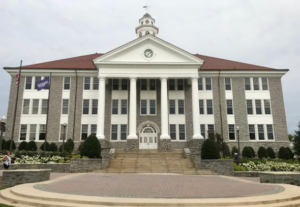Wow, the James Madison University board of visitors voted Friday to keep tuition charges flat for in-state and out-of state students. The action follows decisions by the College of William & Mary, Virginia Commonwealth University and Christopher Newport University to freeze tuition and fees next academic year.
“The action taken today by the board of visitors is reflective of the care we have at JMU for our students and families, many of whom are facing financial hardship in the face of the COVID-19 crisis,” said JMU President Jonathan Alger in a statement. “This decision is yet another way in which we will continue to support students in that endeavor and help ensure access to learning.”
Yeah, right. Meanwhile, JMU will increase its mandatory fees by $124 next academic year, and jack up room & board by $384 — more than $500 — reports the Richmond Times-Dispatch. In related news, the U.S. Commerce Department announced that personal incomes fell nationally by 2% in March, when the effects of the COVID-19 epidemic were being felt. Incomes likely lost even more ground in April as jobless claims accelerated. Many economists are warning of a deflationary economy, in which overall prices decline, which would mean that holding tuition, fees, room and board steady is the monetary equivalent of a price increase.
The non-tuition increases, said JMU in a press release, “are necessary to cover cost factors such as operating costs and contractual obligations, debt service obligations, for new facilities, and student services.
Meanwhile, Virginia families also have to cover cost factors such as operating costs (food, utilities, health care), contractual obligations (alimony and child support payments), and debt service obligations (mortgages, car payments, student loans, and credit cards).
University boards are worried that closing campuses and finishing classes by going online might cause parents to hesitate about enrolling or re-enrolling their kids next year. Resistance to the ever-escalating cost of higher-ed had been growing even before the virus, although the impact was felt mainly by small private institutions that didn’t benefit from hefty state subsidies and financial aid. But there are few signs that many Virginia institutions are taking precautionary measures in case enrollments and revenue head south.
Google searches reveals that Longwood University has cut pay for faculty and staff from 5.7% to 7%, with senior university leaders taking a 15% haircut. The top brass at the University of Virginia as well as the athletic director and several coaches are taking pay cuts as well. That’s all I found. (If readers know of other cases, please let me know and I will update this post.)
Here’s what businesses in the non-protected part of the economy do when they encounter an unprecedented situation like the COVID-19 epidemic: They find ways to cut costs. Cost cutting may include such tried-and-true short-term measures such as restricting travel, entertainment and out-of-town conferences (not a hard decision to make under the current circumstances). Or it may include laying off employees, attacking administrative expenses, shutting down money-losing or marginal product lines, and investing in productivity-enhancing devices. Nothing like that has made it into the headlines. That’s not to say it’s not happening behind the scenes, but if it were, you’d think high-ed institutions would be bragging about it.
The proper way to understand the organizational behavior of nonprofit higher-ed institutions is that they are operated for the benefit of powerful internal constituencies such as administrators and tenured faculty, not the students. It’s that simple.


Leave a Reply
You must be logged in to post a comment.